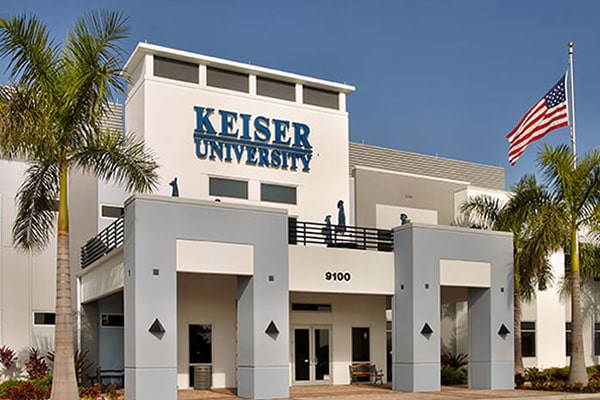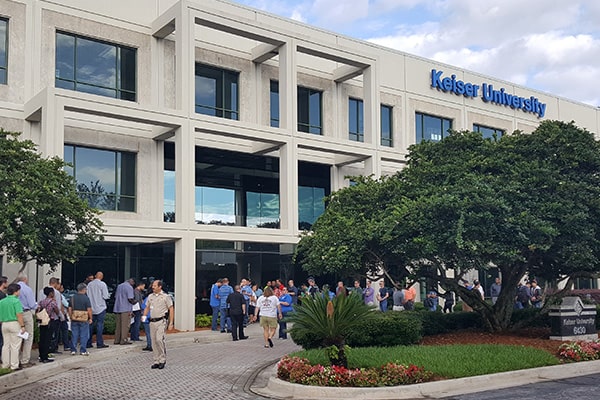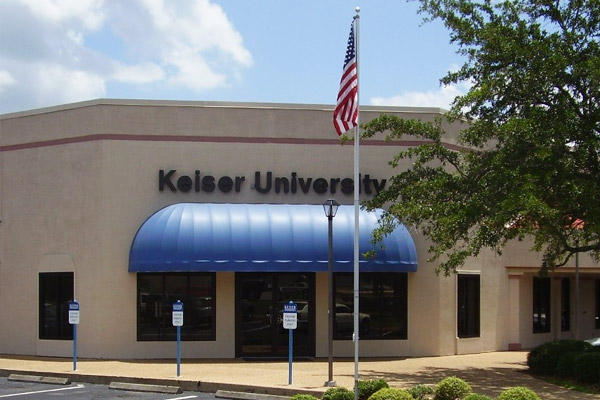Occupational Therapy Assistant, AS (OTA)
Keiser University’s Associate of Science degree in Occupational Therapy Assistant prepares students to work as occupational therapy assistants under direct supervision of a licensed occupational therapist. Occupational therapy is the art and science of helping people gain skills needed to become independent in daily living activities. Students learn the therapeutic use of occupations which include self-care, work and play/leisure activities in order to maximize independent function, enhance development, prevent disability and maintain health. Intervention strategies may include adaptations to a task or environment or compensatory approaches in order to facilitate clients’ achievement of maximum independence.
Program Description
Keiser University’s Associate of Science degree in Occupational Therapy Assistant prepares students to work as occupational therapy assistants under direct supervision of a licensed occupational therapist. Occupational therapy is the art and science of helping people gain skills needed to become independent in daily living activities. Students learn the therapeutic use of occupations which include self-care, work and play/leisure activities in order to maximize independent function, enhance development, prevent disability and maintain health. Intervention strategies may include adaptations to a task or environment or compensatory approaches in order to facilitate clients’ achievement of maximum independence.
Program Mission
The OTA program promotes the development of career-oriented individuals from diverse backgrounds, to achieve the standards of competency necessary for entry-level professional practice. The program strives to prepare the occupational therapy assistant student for an ever-changing healthcare environment. The program adheres to a “students first” philosophy and the acquisition of a foundational knowledge base in occupational therapy, building skills in clinical reasoning, professionalism, evidence-based research and practice, and development of competencies necessary to work as a generalist.
The OTA program is committed to enhancing the Occupational Therapy (OT) profession at the local, state, and national levels. The program sees as part of its mission, the establishment of community partnerships to enhance the provision of student and educator training, to be responsive to practitioners in the field by offering continuing education opportunities, and any additional services needed to advance the OT profession.
Graduates of the program are eligible candidates for the National Board of Certification of Occupational Therapy (NBCOT) examination. Under state guidelines, passage of the NBCOT certification exam permits the graduate to become a licensed professional. A licensed and certified Occupational Therapy Assistant (OTA) practitioner practices under the supervision of a licensed Occupational Therapist (OT) practitioner (Revised, 2023).
Program Goals
- Professional Attributes Upholding occupational therapy’s professional standards and ethical responsibilities while engaging in life-long learning for the safe provision of quality occupational therapy services.
- Occupation-Centered and Client-Centered Care Empirically supported, occupation-centered, client-centered strategies and approaches that contribute to the health and well-being of individuals, groups, and populations.
- Collaboration and Advocacy: Working and advocating for the communities served, while acknowledging the influence of constantly changing environmental factors.
- Practice Competency: Clinical decision-making for prioritizing goals and implementing safe intervention plans based on client responses, under the supervision of the OT.
Accreditation
Click here to see Keiser University OTA Program Performance Data on the NBCOT® National Certification Examination. When you get to the site, select ‘Florida’ for the state and ‘OTA Level Program’ for the program type and choose the year you’d like the view the results for.
Keiser University’s Occupational Therapy Assistant program, Daytona, Fort Myers, Jacksonville, Melbourne, Miami, Pembroke Pines, Tallahassee, Tampa, and West Palm Beach campuses are fully accredited by the Accreditation Council for Occupational Therapy Education (ACOTE) of the American Occupational Therapy Association (AOTA). ACOTE can be reached at the Accreditation Council for Occupational Therapy Education, American Occupational Therapy Association: 7501 Wisconsin Avenue, Suite 510E, Bethesda, MD 20814; Office phone: (301) 652-AOTA; website: www.acoteonline.org.
On April 5, 2025, the Accreditation Council for Occupational Therapy Education (ACOTE) of the American Occupational Therapy Association (AOTA) granted a status of Probationary Accreditation—Inactive to the Fort Lauderdale Campus. ACOTE is located at 7501 Wisconsin Ave, Suite 510E Bethesda, MD. 20814. ACOTE’s telephone number c/o AOTA is (301) 652-6611 and its Web address is www.acoteonline.org. This status indicates that the program is not currently enrolling new students and does not plan to enroll new students in the future. While the program is on Probationary Accreditation-Inactive status, the graduates of the program will be eligible to sit for the national certification examination for the occupational therapy assistant administered by the National Board for Certification in Occupational Therapy (NBCOT). After successful completion of this exam, the individual will be a Certified Occupational Therapy Assistant (COTA). In addition, all states require licensure in order to practice; however, state licenses are usually based on the results of the NBCOT Certification Examination. Note that a felony conviction may affect a graduate’s ability to sit for the NBCOT certification examination or attain state licensure.
Prerequisites for Major Courses
- Satisfactory background check and drug screening (for information on graduate’s eligibility for certification and credentialing click here). Graduates of the program will be eligible to sit for the national certification examination for the occupational therapy assistant, administered by the National Board for Certification in Occupational Therapy (NBCOT). After successful completion of this exam, the graduate will be a Certified Occupational Therapy Assistant (COTA). In addition, most states require licensure to practice; however, state licenses are usually based on the results of the NBCOT certification examination. A felony conviction may affect a graduate’s ability to sit for the NBCOT certification examination or attain state licensure.
- Completion of general education courses with a minimum grade of ―”C” for each course. Successful completion of the following prerequisite courses: BSC2085C, BSC2086C, MAT1033 and PSY1012.
- Cumulative grade average of 3.0 on a 4.0 scale.
- Must earn a minimum of an 18 on the University Entrance Exam.
Cost of Attendance
Program Outline
To receive an Associate of Science degree in Occupational Therapy Assistant, students must earn 83 credit hours. Program requirements are as follows.
Each course in the Occupational Therapy Assistant major is a prerequisite for the subsequent course and therefore must be passed with a minimum “C” grade in order to proceed successfully through the program.
Lower Division Courses
| Occupational Therapy Assistant Major Courses (57.0 credit hours) | |
|---|---|
| Introduction to Occupational Therapy | 4.0 credit hours |
| Human Occupation and Development Across the Life Span | 4.0 credit hours |
| Kinesiology for Occupational Therapy Assistants | 4.0 credit hours |
| Musculoskeletal System Disorders/Assessment and Treatment Strategies | 4.0 credit hours |
| Neurological Disorders/Assessment and Treatment Strategies | 4.0 credit hours |
| Psychiatric Disorders, Assessment and Treatment Strategies | 4.0 credit hours |
| Therapeutic Interventions for Individuals, Groups, and Populations | 4.0 credit hours |
| Fieldwork I | 2.0 credit hours |
| Occupational Therapy for the Physically Disabled | 4.0 credit hours |
| Pediatric Occupational Therapy | 4.0 credit hours |
| Aging and Performance Skills | 4.0 credit hours |
| Occupational Therapy Pre-clinical Practicum | 3.0 credit hours |
| Fieldwork II | 12.0 credit hours |
| Behavioral/Social Science (3.0 credit hours) | |
|---|---|
| PSY1012 - Introduction to Psychology | 3.0 credit hours |
| SGY1000 - Introduction to Sociology | 3.0 credit hours |
| Communications (3.0 credit hours) | |
|---|---|
| SPC1017 - Speech | 3.0 credit hours |
| Computers (3.0 credit hours) | |
|---|---|
| CGS1000C - Introduction to Computers | 3.0 credit hours |
| English (3.0 credit hours) | |
|---|---|
| ENC1101 - English Composition I | 3.0 credit hours |
| ENC2102 - English Composition II | 3.0 credit hours |
| Humanities/Fine Arts (3.0 credit hours) | |
|---|---|
| AML1000 - American Literature | 3.0 credit hours |
| ENL1000 - English Literature | 3.0 credit hours |
| CWL1000 - Contemporary World Literature | 3.0 credit hours |
| Mathematics (3.0 credit hours) | |
|---|---|
| MAC2105 - College Algebra | 3.0 credit hours |
| MAT1033 - Intermediate Algebra | 3.0 credit hours |
| Natural Science (8.0 credit hours) | |
|---|---|
| BSC2085C - Human Anatomy and Physiology I | 4.0 credit hours |
| BSC2086C - Human Anatomy and Physiology II | 4.0 credit hours |
Note: Each course in the Occupational Therapy Assistant major is a prerequisite for the subsequent course and therefore must be passed with a minimum "C" grade in order to proceed successfully through the program.
Program Outcomes
State Licensure Disclosure
Occupational Therapy Assistant Testimonial
Stephany Hernandez chose Keiser University’s fast-paced OTA program because she felt it would enable her to help more people. She appreciated the way Keiser University made her feel like family.

















